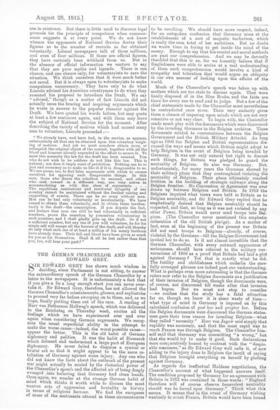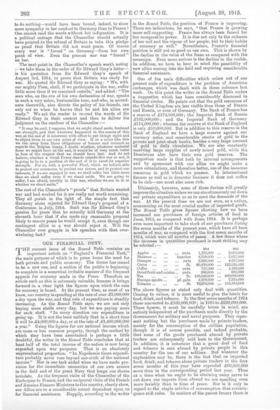THE GERMAN CHANCELLOR AND SIR EDWARD GREY.
SIR ED*ARD GREY has shown much wisdom in deciding, since Parliament is not sitting, to answer the extraordinary speech of the German Chancellor by a letter to the newspapers. It is unfortunately a. fact that if you give a lie a long enough start you can never over- take it. Sir Edward Grey, therefore, has not allowed the German Chancellor's misstatements, glosses, and sophistries to proceed very far before swooping on to them, and, as we hope, finally putting them out of the race. A reading of Herr von Bethmann Hollweg's speech, which was delivered in the Reichstag on Thursday week, excites all the feelings which we have experienced over and over again when considering German arguments. We reoog- nize the usual superficial ability in the attempt to make the worse cause—indeed, the worst possible cause— appear the better. This is the old habit of German diplomacy and politics. it was the habit of Bismarck which debased and undermined a large part of Europe= diplomacy. He never failed to disguise a cynical or brutal act so that it might appear to be the mere re- taliation of Germany against some injury. Any one who did not know the facts about the outbreak of the present war might actually be misled by the rhetorical power of the Chancellor's speech and the affected air of being deeply wronged into believing that Germany had clean hands. Once again, we wonder at the strange German habit of mind which thinks it worth while to discuss the most wanton acts of aggression and brutality in history in terms of religious fervour. We find the smugness of some of the sentiments uttered in these circumstances to be revolting. 'We should. have snore respect, indeed, for an outspoken confession that Germany aims at the establishment of a sort of majestic barbarism, which is really the sum total of her ambitions. But no doubt we waste time in trying to get inside the mind of the enemy. Enough to say that his mental and moral methods are past our comprehension. And we may be devoutly thankful that this is so, for we honestly believe that if Englishmen were able to arrive at a real understanding of them such comprehension would. involve a kind of sympathy and toleration that would argue an obliquity in our own manner of looking upon the affairs of the world.
Much of the Chancellor's speech was taken up with matters which are too stale to discuss again. They wore finally disposed of in the Blue Books, and the facts are there for every one to read and to judge. But a few of the chief statements made by the Chancellor must nevertheless be contradicted once more. Their very audacity gives them a chance of imposing upon minds which are not very retentive or not very clear. To begin with, the Chancellor made much play with the documents which were discovered by the invading Germans in the Belgian archives. These documents related to conversations between the Belgian Government and. the British Military Attach6. As long ago as 1906 the Belgian and British representatives dis- cussed the ways and. means which Britain might adopt to help Belgium in the event of Belgium being invaded by Germany. It was not only natural but right to discuss such things, for Britain was pledged to guard the neutrality of Belgium. So also was Germany. But, unfortunately, for many years the Germans showed by their military plans that they contemplated violating the neutrality of Belgium. Their plans ultimately reached fruition in the building of strategic railways along the Belgian frontier. No Convention or Agreement was ever drawn up between Belgium and Britain. In 1913 the Belgians inquired what views were held in Britain as to Belgian neutrality, and Sir Edward. Grey replied that he emphatically desired that Belgian neutrality should be respected, and that, so long as it was not violated by any- other Power, Britain would. never send troops into Bel- gium. (The Chancellor never mentioned this emphatic reiteration of the old. British pledge). As a matter of fact, even at the beginning of the present war Britain did not send troops to Belgium—already, of course. violated. by the Germans—till the Belgian Government had invited her to do so. Is it not almost incredible that the German Chancellor, with every outward. appearance of seriousness, should have referred to the military con- versations of 1906 as a proof that Britain had laid a plot against Germany ? Yet that is exactly what be did. The futility and childishness which underlie the care- fully arranged phrases are indeed past our understanding. What is perhaps even more astounding is that the German rulers now refer to the Belgian documents as a justification of their invasion of Belgium, though the documents were, of course, not discovered till weeks after that invasion had begun. But we must not stop to consider —we confess that the study has a fatal attraction i for us, though we know it s sheer waste of time— what type of mind in Germany is imposed on by this calculated confusion of post hoc and. propter hoc. Before the Belgian documents were discovered, the German states- men gave their true reason for invading Belgium—what they called "necessity." Herr von Jagow said simply that rapidity was necessary, and that the most rapid way to reach France was through Belgium. The Chancellor him- self said that Germany was committing "a wrong," but that she would. try to make it good. Such declarations were comparatively honest by contrast with the "despic- able meanness," as Sir Edward Grey well calls it, of now adding to the injury done to Belgium the insult of saying that Belgium brought everything on herself by plotting against Germany. As regards the ineffectual Haldane negotiations, the Chancellor's account of what happened answers itself. The condition proposed by Germany for an agreement with Britain in 1912 was contained in these words : "England therefore will of course observe benevolent neutrality should war be forced upor Germany." Think what this means. It means that in the event of Germany wishing wantonly to crush France, Britain would have been bound to do nothing—would have been bound, indeed, to show more sympathy in her conduct to Germany than to France ! One cannot read the words without hot indignation. It is a, political outrage that the Chancellor should actually have pointed to the refusal of Britain to take this pledge as proof that Britain did not want peace. Of course every war is " forced " on Germany—from her own point of view. Even the present war was " forced " on her.
The next point in the Chancellor's speech worth noting —we take them in the order of Sir Edward Grey's letter— is his quotation from Sir Edward Grey's speech of August 3rd, 1914, to prove that Britain was ready for war. He quoted Sir Edward Grey as saying: "We, with our mighty Fleet, shall, if we participate in the war, suffer little more than if we remained outside," and added: "The man who, on the eve of his own declaration of war, speaks in such a very sober, businesslike tone, and who, in accord- ance therewith, also directs the policy of his friends, can only act so when he knows that he and his allies are ready." We ask the reader to re-read the words of Sir Edward Grey in their context and then to deliver his judgment on the candour of the Chancellor :— "IL may be said, I suppose, that we might stand aside, husband our strength, and that whatever happened in the course of this war, at the end of it intervene with effect to put things right and to adjust them to our own point of view. If in a crisis like this we run away from those obligations of honour and interest as regards the Belgian treaty, I doubt whether, whatever material force we might have at the end, it would be of very much value in face of the respect that we should have lost. And do not believe, whether a Great Power stands outside this war or not, it is going to be in a position at the end of it to exert its superior strength. For us, with a powerful Fleet, which we believe able to protect our commerce, to protect our shores, and to protect our interests, if we are engaged in war, we shall suffer but little more than we shall suffer even if we stand aside. We are going to suffer, I am afraid, terribly in this war, whether we are in it or whether we stand aside."
The rest of the Chancellor's "proofs" that Britain wanted war and had worked for it are really not worth examining. They all perish in the light of the simple fact that Germany alone rejected Sir Edward Grey's proposal of a Conference in July, 1914. Such was Sir Edward Grey's passion for peace that he actually told Germany at the eleventh hour that if she made any reasonable proposal likely to ensure peace he would accept it, even though our contingent allies in a war should reject it. Will the Chancellor ever grapple in his speeches with that over- whelming fact ?



































 Previous page
Previous page